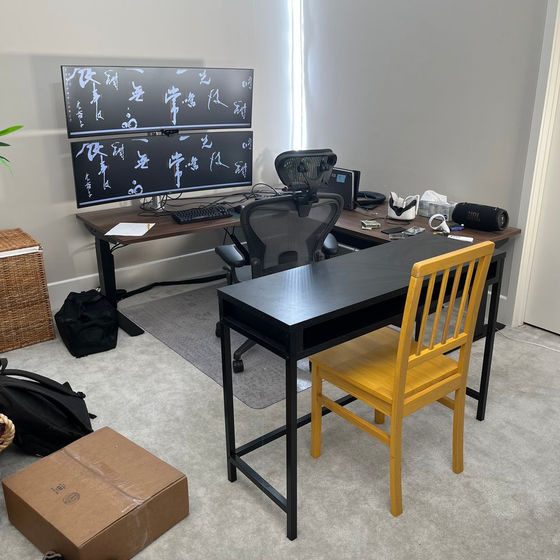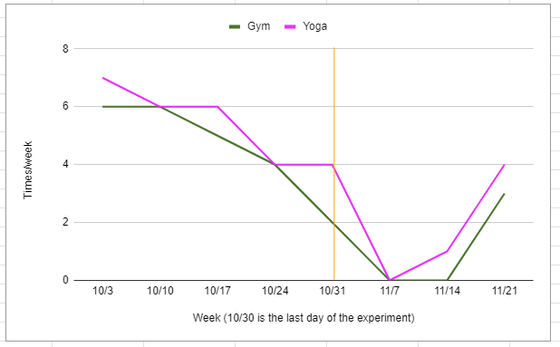Successfully tripled productivity by having others monitor their activities 16 hours a day, 7 days a week

Simon Berens, who works as a software engineer at Meta, reported, ``After a month of hiring an assistant to monitor my activities for 16 hours a day, my productivity tripled.'' I'm here.
I Hired 5 People to Sit Behind Me and Make Me Productive for a Month — Simon Berens
Mr. Berens has tried to increase productivity in various ways so far. It seems that he has also developed his own tools, but he said that he could only increase productivity by about 20%. 'I wanted to be more productive without my own effort,' Berens said. Therefore, Mr. Berens hired an assistant to sit behind him and monitor his work, hoping that by letting him monitor himself, he would have the effect of ``reducing wasted time napping and surfing the web''.
A hired assistant monitors Mr. Berens' activities on a shift basis, 16 hours a day, 7 days a week. Mr. Berens' work environment is as follows, and one assistant always monitors Mr. Berens' activities at the desk prepared behind the desk.

On the first day of the experiment to have the assistant monitor his work, Mr. Berens first felt that he felt a little uncomfortable going to the bathroom because the workplace and the bathroom were close. Other than that, the first day was definitely a success, and he asked his assistant to prepare meals. However, on the first day of the shift, when Mr. Berens went out on a date, it seems that an incident occurred in which the assistant who had asked him to wait at work and at home returned. In addition, it seems that various accidents occurred, such as it becoming clear that the assistant in charge of monitoring Mr. Berens was quietly watching pornography.
Mr. Berens did not feel that his activities had become productive during the experiment, but looking back, he was able to realize the improvement in productivity, such as completing the task that previously took a whole week in one day. It is said that there was
Also, when Mr. Berens recruited an assistant to monitor his own activities, he clearly stated that ``I may ask you to do chores,'' but actually asking the assistant to do chores such as cooking is `` I'm still sorry,' he said. However, the food prepared by the assistants was of much higher quality than the food they prepared themselves, which 'may have contributed to increased satisfaction with the meal and increased productivity,' Berens said. rice field.
In addition, a big benefit of having the assistant monitor his activity, Berens says, 'It helped me avoid visiting bad websites that weren't productive and allowed me to transition from task to task more quickly. I usually take breaks and linger when transitioning from task to task, but now I'm starting tasks as soon as my assistant is in the room, or at least consciously looking for new tasks. ' said.
To objectively measure his own tasks, Berens uses
Then, based on the measurement data, the activity time per week was classified into 'productive (blue line)' and 'unproductive (red line)'. Since the experiment ended on October 30th, there will be no monitoring by the assistant after the 30th. Before October 30th, productive activity time exceeded non-productive activity time, but after the eyes of the monitoring, unproductive activity time exceeded productive activity time. became. In addition, Mr. Berens seems to have participated in the hackathon for six days from November 5th, saying, ``Despite participating in the hackathon all night, productive activities (time to write code) were only one day. It took about nine hours,” he wrote.

The graph below also shows the time spent exercising. While I was under surveillance, I was spending 2-6 hours per week at the gym and 4-7 hours per week doing yoga. You can see that

Furthermore, the following figures compare the productive activity time (Adj. Productive) and unproductive activity time (Adj. Unproductive) per week during the experiment (During) and after the experiment (After). As mentioned above, Mr. Berens participated in the hackathon for about a week from November 5th, so the data during this period is not used for the following numerical comparisons. Productive activity time has increased by about 2.8 times due to monitoring eyes.

Mr. Berens did not measure the time spent on reading, dancing, and sports during the experiment, so he wrote, ``In fact, it is no exaggeration to say that the experiment has more than tripled my productivity.'' Did.
During the experiment, Mr. Berens was constantly under surveillance, so he felt a little irritated at the end of the day. He felt that this was due to the lack of a routine to recover from fatigue, but when he measured his sleep time during and after the experiment using the activity tracker Fitbit and the sleep measurement tool Eight Sleep, he was able to sleep. It can be seen that there was little change in time.

In addition, it seems that Mr. Berens prepared a budget of 10,000 dollars (about 1.3 million yen) in order to have him monitor himself for 16 hours a day for a month, but the assistant escapes and there are errands and monitoring work Ultimately, the cost of hiring an assistant was about $ 5,000 (about 660,000 yen) due to the timing when there was no need for it.
Related Posts:
in Note, Posted by logu_ii







